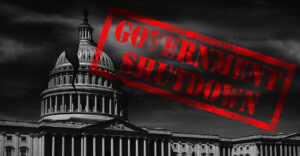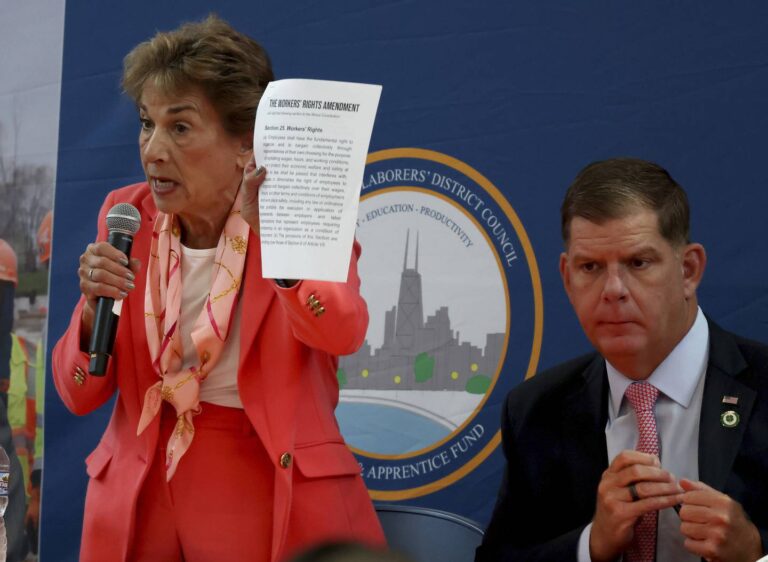Atop ballots throughout Illinois this fall, voters will be asked whether Illinois should enshrine into the state constitution the right of workers to unionize and collectively bargain, a proposal backed by organized labor to preempt future right-to-work laws but opposed by anti-union groups that contend it will raise taxes and grant unions unprecedented power.
Known as the “Workers’ Rights Amendment” by supporters and “Amendment 1” by opponents, the proposal up for voter ratification that would give workers a “fundamental right” to organize is an outgrowth of former single-term Republican Gov. Bruce Rauner’s unsuccessful attempts years ago to curb union power that led to an unprecedented two-year state budget stalemate.
Advertisement
And while supporters and opponents don’t agree on much, they do agree that if it is ratified, the proposed amendment could chart a new direction for organized labor not only in Illinois, but nationwide.
“It’s possible that if unions win here, it will become the future of the labor movement,” said Mailee Smith, labor policy director at the conservative Illinois Policy Institute, which opposes the amendment.
Advertisement
“This would be the strongest constitutional protection in a state constitution in the country,” said Marc Poulos, the “Vote Yes for Workers’ Rights” campaign committee’s counsel and executive director of the Indiana, Illinois, Iowa Foundation for Fair Contracting.
The battle is the latest proxy fight between Republicans and Democrats over efforts to change the Illinois Constitution and has already generated significant fundraising, especially by labor.
The “Vote Yes” campaign committee has raised over $13 million, much of it from building trade unions, while the “Vote No on Amendment 1″ committee founded by Illinois Policy Institute leaders has raised $1 million, all from conservative megadonor and businessman Richard Uihlein. The CEO of packing and shipping firm Uline has already spent more than $40 million this year on political campaigns in Illinois and is backing Republican Darren Bailey for governor.
While the dollars raised are notable, it pales in comparison to the more than $124 million raised two years ago by groups for and against a proposed change to the Illinois Constitution that would have switched the state from a flat-rate income tax to a graduated-rate system. That amendment proposal, backed by Democratic Gov. J.B. Pritzker, failed.
The current proposed amendment goes further than laws in New York, Missouri and Hawaii, three states that have constitutional amendments granting workers the right to organize and collectively bargain.
The proposed Illinois amendment would guarantee not only the right to organize for the most common elements of collective bargaining, like wages, hours and working conditions, but also for “economic welfare and safety at work.”
It also would essentially ban so-called right-to-work laws or ordinances, which prohibit companies and unions from agreeing to require union membership as a condition of employment. Right-to-work laws disempower unions by allowing workers to avoid paying “fair share” fees to unions — money used for nonpolitical union costs for actions such as collective bargaining.
Right-to-work laws have spread to 27 states, including every Illinois border state except Missouri, where voters rejected that state’s proposed law in a 2018 referendum. Those laws only affect private workers. The U.S. Supreme Court ruled in 2018 in the Illinois-based Janus v. AFSCME case that public workers shouldn’t have to pay “fair share” fees to a union they don’t want to join.
Advertisement
The “clear effect” of the proposed amendment change on the Nov. 8 ballot in Illinois would be to block future legislators from enacting right-to-work laws or passing other laws that weaken the collective bargaining rights of public employees, said Martin Malin, who founded Chicago-Kent College of Law’s Institute for Law and the Workplace.
[ What is right to work, and how does it apply to Illinois workers? ]
If judges broadly interpret the phrase “economic welfare,” the proposed amendment could also benefit public workers, though federal labor laws likely would preempt such expansions for many, if not all, private workers, said Malin, who President Joe Biden appointed to a federal panel that resolves collective bargaining impasses between federal agencies and unions.
Advocates and opponents of the proposed changes have disagreed over how the law might affect workers.
The amendment would protect workers’ rights from ideological changes in legislative bodies, Illinois AFL-CIO President Tim Drea said.
“We’re taking workplace safety, wages and economic stability, and putting those rights into a lockbox and keeping politicians from getting into them,” said Drea, who chairs the “Vote Yes” committee.
It was intentionally drafted to apply to all workers, Poulos said, adding it will cover “droves” of workers not yet protected by federal or state law, such as agricultural workers and independent contractors, and would also work as a backstop if the federal laws that protect many private workers were ever repealed by federal courts or legislators.
Advertisement
But Smith argued that the part of the amendment that guarantees a fundamental right to organize and collectively bargain would not apply to private workers because the National Labor Relations Act already covers those workers. The amendment would give public worker unions greater power to demand more, she said.
“It’s going to drive up the cost of government, and that cost is going to be passed onto taxpayers.”
The proposed amendment would become part of the constitution if it is approved by 60% of those voting on the question or a majority of those casting a ballot in the election.
Some Republicans in the General Assembly joined Democrats last year to get the measure on the ballot, a development that underscored just how much the political winds have shifted since Rauner was governor, when more GOP lawmakers followed his lead as he helped fund their political campaigns.
Lincolnshire passed a right-to-work plan specific to the Chicago suburb in 2015. A federal judge ruled two years later that only states can enact such laws. Pritzker in 2019 signed into law a bill banning local governments from establishing right-to-work zones.
While Pritzker played no formal role in getting the amendment on the ballot and hasn’t donated money to the “Vote Yes” committee, he has made support for organized labor a theme of his reelection campaign.
Advertisement
“We need to make union organizing a constitutional right and stop Republican efforts to eliminate collective bargaining,” he said while accepting an endorsement Monday from the Chicago branch of the Laborers’ International Union of North America.
Though some Republican lawmakers backed the measure, the Illinois Policy Institute and its allied legal service, Liberty Justice Center, sued to have the amendment removed from the ballot. They alleged it would be preempted by federal laws and that a vote on the amendment would waste taxpayer money. A Sangamon County judge struck down the lawsuit in May and an appellate court judge agreed.
Parts of the amendment are clearly consistent with federal labor laws, Malin said.
“The National Labor Relations Act expressly leaves the question of right-to-work laws to each state,” he said.
Workers hold no power outside of legislators, Poulos of the ““Vote Yes” campaign said. He sees the proposed amendment as a rebalancing that would protect people “in the very place they spend nearly their entire lives.”
If the proposed amendment passes, Illinois would become “the No. 1 state to protect workers,” Poulos said. Strong workers rights would help the state compete for labor in hard-to-fill fields like nursing, teaching and policing, he added.
Advertisement
The amendment would make the state uniquely anti-business, said Todd Maisch, president and CEO of the Illinois Chamber of Commerce. Many nearby states that could be competing for business have right-to-work laws, he said.
“It’s a terrible message to send to the rest of the nation,” Maisch said.
He foresees few immediate impacts if the amendment passes. Right-to-work laws are unlikely to pass in Illinois anytime soon regardless, he said.
“But if this is in the constitution for 10 years, there’s an open invitation for labor lawyers to take the language and push it to the absolute limits,” Maisch added.
If it passes, the proposal may not be unique for long. Union approval across America has quickly risen to 71%, a level not seen since 1965, a late August Gallup poll showed. The total number of union employees in Chicago and Illinois grew last year for the first time since 2017, according to research by Robert Bruno, a University of Illinois at Urbana-Champaign labor professor, and Frank Manzo, director of the union-funded Illinois Economic Policy Institute.
The novel Workers’ Rights Amendment proposal might serve as a road map for the labor movement in other states. If right-to-work spread across the country, a workers’ rights amendment could too, the Illinois AFL-CIO’s Drea said.
Advertisement
“Workers in other states — could be in right-to-work states — they’re going to say, ‘You know what, I should have that,’” he said.
jsheridan@chicagotribune.com







